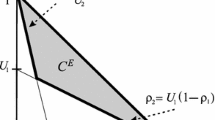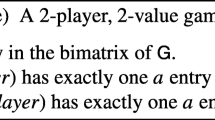Abstract
We show that every N-player K 1 × ... × K N game possesses a correlated equilibrium with at least \(\prod_{i=1}^{N} K_i -1 - \sum_{i=1}^{N} K_i (K_i -1)\) zero entries. In particular, the largest N-player K × ... × K games with unique fully supported correlated equilibrium are two-player games.
Similar content being viewed by others
References
Artin M.(1991): Algebra. Prentice-Hall, Englewood Cliffs
Aumann R.J(1974) Subjectivity and correlation in randomized strategies. J Math Econ 1: 67–96
Hart S., Schmeidler D.(1989): Existence of correlated equilibria. Math Oper Res 14: 18–25
Nitzan, N.: Tight correlated equilibrium. Center for the Study of Rationality, Hebrew University of Jerusalem, Discussion Paper # 394 (2005)
Author information
Authors and Affiliations
Corresponding author
Additional information
We thank an anonymous referee for most useful comments. The first author acknowledges financial support from Spanish Ministry of Science and Technology, grant SEJ2004-03619, and in form of a Ramón y Cajal fellowship. The second author acknowledges support by the PASCAL Network of Excellence under EC grant no.506778, as well as from Spanish Ministry of Science and Technology and FEDER, grant BMF2003-03324. Both authors also acknowledge financial support from BBVA grant “Aprender a jugar.”
Rights and permissions
About this article
Cite this article
Germano, F., Lugosi, G. Existence of Sparsely Supported Correlated Equilibria. Economic Theory 32, 575–578 (2007). https://doi.org/10.1007/s00199-006-0127-1
Received:
Accepted:
Published:
Issue Date:
DOI: https://doi.org/10.1007/s00199-006-0127-1




